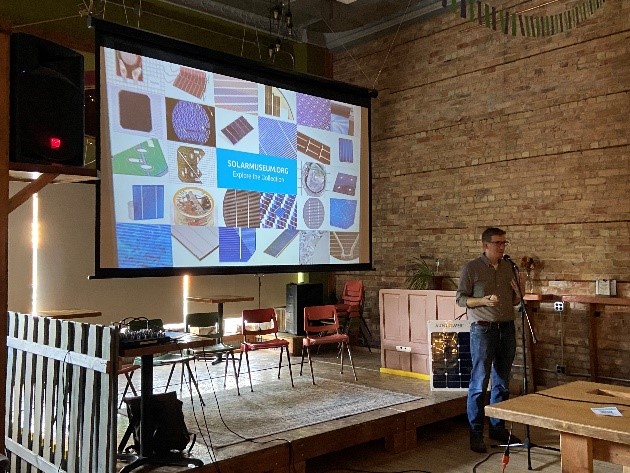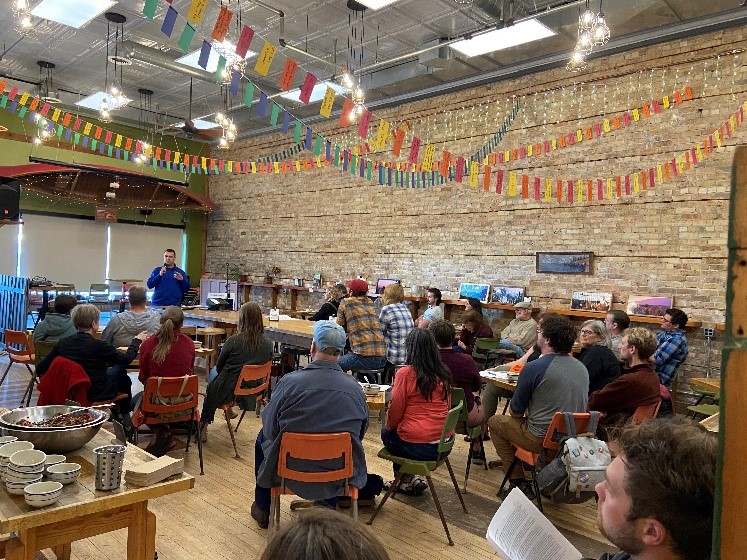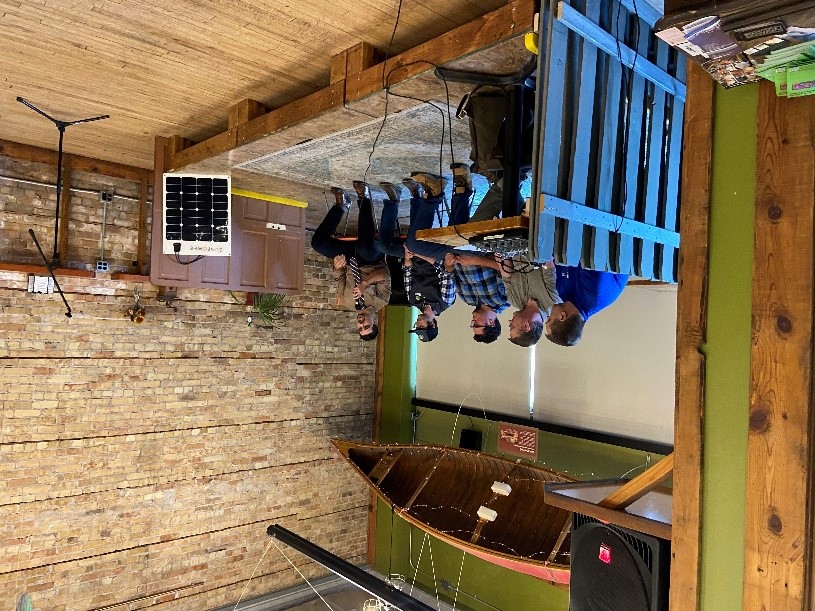Solar Energy
At our fifth Sustainable Duluth event, partnered with the Duluth Folk School, over 40 people came out to learn about solar energy! We were excited to welcome so many people to learn about how solar works, the process of installing solar panels, and how to finance solar projects. If you weren't able to attend, here's what you missed!

Our first presenter was Karl Wagner from the Museum of Solar Energy. His presentation provided an in-depth look into the history of solar energy and how solar panel technology works. Solar energy technology has come a long way since its inception in 1931, when solar panels were first developed as a way to measure light. Since then, there have been many amazing steps in solar such as solar panels on satellites in 1958, mainstream use of solar energy in the 1980s, and a massive decrease in price from 1975-2015. During the energy crisis of the 1970s, there was a significant push towards renewable energy sources, including solar. This era saw the beginning of more widespread use of solar panels for powering homes and businesses. From 1975 to 2015, there was a dramatic decrease in the cost of solar panels, largely due to advancements in manufacturing processes, economies of scale, and improvements in efficiency. Modern solar panels utilize silicon to harness sunlight, where photons dislodge electrons from the silicon atoms, generating electricity as these electrons flow through a circuit within the panel. Once installed, solar panels have minimal operating costs and can significantly reduce electricity bills over their lifetime.

Our second presenter, Paul Helstrom, serves as a customer programs manager at Minnesota Power. During his presentation, Paul outlined a comprehensive timeline for homeowners interested in installing solar panels. He emphasized the importance of understanding your motivations for choosing solar and conducting thorough research into its benefits and potential drawbacks. Typically, the upfront cost for installing a solar system averages around $20,000. However, buyers can benefit from a 30% tax credit through the Inflation Reduction Act and other additional financing opportunities, including Minnesota Power's grant program. Once installed, a solar system allows homeowners to offset their electricity usage by generating their own power. Excess energy produced is fed back into the grid, and homeowners are credited for this surplus, significantly reducing or potentially eliminating their electricity bills. In some cases, homeowners may even receive payments if they produce more energy than they consume. Paul also highlighted that adopting solar energy is not the only way to save on energy costs. Many utility companies, including Minnesota Power, offer energy efficiency programs designed to help homeowners reduce their current energy consumption.

Following the presentations, we held a panel featuring five local community leaders in solar energy.
Dane Larson serves as a customer programs manager at Wolf Track Energy, a prominent solar installer based in the Duluth area. Wolf Track Energy specializes in guiding businesses and homeowners through the entire solar installation process. For those interested in saving energy at their home or business, Dane first recommends starting with an energy audit. This audit helps improve overall energy efficiency in homes, leading to potential cost savings even before considering solar installation. Starting on the solar installation journey involves several steps. Consultation and design phases can be time-consuming as they are tailored to meet specific needs. However, once the contract is signed, installation can begin within just over a month's time. Although depending on the supply chain issues, it can take time for materials to be ready.
Brett Crecelius is the Community Resilience Project Coordinator with the City of Duluth and is currently leading the research for the Renewables Advancing Community Energy Resilience (RACER) project. The award brought close to $1 million in funds to develop Duluth’s solar future while creating a toolkit for other municipalities to utilize. The City will work with community partners to understand how and where solar photovoltaics and battery storage should be deployed to strengthen community resiliency in the face of extreme weather events. As the only municipality to be awarded funds, the City is looking forward to providing a community solar and storage planning toolkit for other cold climate cities. Currently, the City of Duluth is evaluating sites to install solar, and seven potential sites have been identified as great candidates for installations.
Bret Pence is the Greater Minnesota Director at Minnesota Interfaith Power and Light (MNIPL) where he serves as a knowledgeable resource on energy policy, efficiency, and solar project consultation. He also plays a key role in supporting MNIPL's volunteer network. Solar power is highly versatile, making it accessible and beneficial for virtually any home. If installing solar panels at your current residence isn't feasible, Bret encourages reaching out to workplaces or community spaces where you're involved. Advocating for solar installation in these places can extend the benefits of renewable energy to broader community settings, contributing to sustainability efforts on a larger scale.
Cameron Kadlubowski is the Community Energy Transition Specialist at Ecolibrium3. His role focuses on facilitating a fair and inclusive transition to residential energy solutions within the region. For homeowners curious about the viability of solar energy for their homes, Cameron recommends exploring Duluth Shines. This map provides insights into the quality of solar exposure your roof receives. It offers estimates on the potential energy production achievable through solar panels, helping homeowners make informed decisions about adopting solar technology. Ecolibrium3 is a good resource for starting the solar installation process as they provide energy audits. Before contacting an installer, make sure to get an energy audit to further the potential for energy savings. Contact the Eco3 Energy Team at 218-461-9644 or energy@ecolibrium3.org.
Do you still have questions after this session? Come to our next session which will dive into sustainable transportation, on Thursday, July 18th, 6-7:30pm!
Check out more of these helpful resources:
*Note: 2024 funding was maxed out, but likely will be offered again in 2025
*Note: accessory solar can be found on Page 37 of the PDF (UDC section 50-20.5 Section I – “accessory solar or geothermal power equipment”)
- City of Duluth Resources
- DSIRE, Database of State Incentives for Renewables
- Rewiring America
- Latest solar industry market report
- NABCEP website
- MN Power Solar Installation Tips
- MN Power Distributed Generation
- MN Power Solar Resources
- MNIPL Solar Resources
- Solar United Neighbors MN
- Solar Financing
- State Energy Rebates
- AEOA energy weatherization




